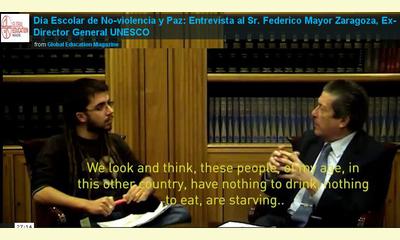|
|
Culture of Peace: Interview with Mr. Federico Mayor Zaragoza, ex-Director-General of UNESCO
un articulo por Javier Collado, Director of Edition at Global Education Magazine
Video: Interview with Federico Mayor
On the occasion of School Day of Non-violence and
Peace, I interviewed Mr. Federico Mayor Zaragoza,
Ex-Director-General of UNESCO. We talked of
becoming aware of the responsibility to build
today, tomorrow´s schools. Some schools should be
internationally organized, with peaceful scenarios
and non-violent ways, because we will depend on
them for the real educational praxis
transformation of the world.

click on photo to enlarge
In the interview, we talked about the need to
create a transcultural, hybrid and cosmopolitan
educational process, which acts as a new vibration
pattern, as crossing waves in water. We talked
about the reconceptualization of schools and its
social function as psychological builders of the
citizens of future generations. One of the biggest
challenges of the future generations is the
process of directing humanity towards new forms of
cooperation and democratic social organization,
which integrates the cultural diversity as a
source of wealth, as well as fair and ecologically
sustainable relationships with the environment.
That is the challenge that the world faces today
to achieve the Millennium Development Goals
(MDGs). We must reply to them with a new
awareness-identity of “Homeland-Earth”, where the
human being is seen in the context of its
evolution, because the future history of our
biosphere will depend of the future history of
knowledge we develop and how we choose to apply
it.
This requires a radical change in the ontological
models of sustainable development, global
education and world-society. Then, if we look
ahead to the future, the 21st century should
promote the transformation of planetary culture
through the consciousness of human beings. This
new vision of reality has to be holistic and
transdimensional: understanding the human being as
an integral part of the cosmos as a whole. In this
sense, concepts such as transnational,
transcultural, transpolitical, transreligious and
transhumanist will represent the global standards
for cooperation for human development with no
boundaries, unifying the force of heterogeneity
and pluralism, because when it concerns music,
art, literature, philosophy and thought, cultural
globalization does not tend to uniformity, but
rather the opposite: the world´s cultures
fertilize themselves by engendering planetary
children.
We talked, in short, about the need to re-baptize
schools and empower them, saving them from
academic drift and moving them into a global
social reality: where 40,000 people die every day
from causes stemming from extreme poverty.
Cultivating a better future is possible and we can
do it in a collective way with justice and
solidarity through a responsible and creative
participatory democracy, based in culture of
peace.
The interview is in Spanish with English subtitles,
available here
|








|
DISCUSSION
Pregunta(s) relacionada(s) al artículo :
Understanding the culture of peace, What are the key videos?
* * * * *
Comentario más reciente:
:
To begin this discussion, here are videos from three people who first developed the culture of peace concept at UNESCO and the United Nations:
Anwarul Chowdhury: Culture of Peace
David Adams: Culture of Peace
Federico Mayor: Culture of Peace
Federico Mayor: Cultura de Paz

|
|









